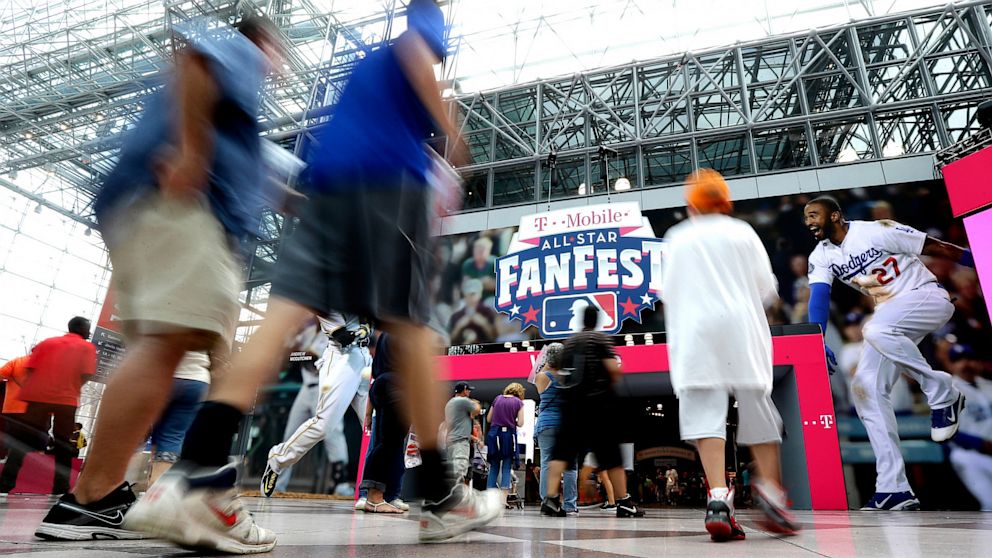Major League Baseball Sued by All-Star Volunteer for Unpaid Work
A man in New York City is suing Major League Baseball for unpaid wages.

Aug. 9, 2013 — -- A volunteer of the 2013 All-Star FanFest is suing Major League Baseball for unpaid wages and is represented by a law firm that won a high-profile judgment in favor of unpaid interns.
Major League Baseball hosted its FanFest, what it called "the largest interactive baseball theme park in the world," in New York City last month with the help of about 2,000 volunteers. The five-day All-Star weekend events were sponsored by large corporations and brought about $191.5 million into the New York City economy, the league has claimed.
The lawsuit, filed on Wednesday with the U.S. District Court for the Southern District of New York, also alleges the league used unpaid volunteers when it hosted the All-Star Game in New York City in 2008.
A spokesman for Major League Baseball said he could not comment on pending litigation.
John Chen, the plaintiff who hopes to expand the lawsuit into a class action, is represented by Outten and Golden LLP, the law firm that represented the unpaid interns for the movie "Black Swan" who sued Fox Searchlight. A federal district court judge ruled in June that the company should have paid the two interns because they were regular employees.
A Fox spokesman has said the court's rulings are "erroneous, and [Fox] will seek to have them reversed by the [U.S. 2nd Circuit Court of Appeals] as quickly as possible."
Chen, of Rego Park, N.Y., worked as an unpaid volunteer on June 1, then again for four days in July. In total, Chen claimed, he worked about 17 hours, according to the lawsuit.
Chen maintained in the complaint that the league violated the Fair Labor Standards Act and New York Labor Law by failing to pay at least minimum wage to volunteers.
Chen declined to comment on the case through his attorney, Justin Swartz. But Swartz laid out some of the lawsuit's goals.
"We hope to stop for-profit companies like Major League Baseball from soliciting and receiving free labor," Swartz told ABC News. "The minimum wage law prohibits for-profit private companies from accepting free volunteer labor."
Swartz declined to reveal Chen's age and occupation, saying that his client prefers privacy.
The volunteers didn't receive All-Star Game tickets, though Major League Baseball gave the 2,000 volunteers the chance to win one pair of All-Star Game tickets if they worked "three shifts at any of the All-Star events," the lawsuit said.
The court filing against Major League Baseball said: "Instead of paying them for their work, MLB, the world's preeminent professional baseball league with annual revenue of more than seven billion dollars, provided volunteers with 'a shirt, a cap and a cinch drawstring backpack,' free admission for the volunteer and one guest to FanFest, a water bottle and a baseball."
Chen attended mandatory information sessions, a one-hour session plus a two-hour session, the filing added, and part of his duties included stamping wrists of customers and handing bags of FanFest paraphernalia to customers, who were charged $35 as adults and $30 for children 2 years of age and older.
Swartz's firm, Outten and Golden, also represents interns who filed a lawsuit in June against Condé Nast claiming the company did not pay them minimum wage during their summer jobs at W Magazine and The New Yorker in 2009 and 2010.
Read More: Colorado Rockies Fan Sues Baseball Club for Resell Ticket Exclusions
A similar lawsuit against Hearst Corp., also one of Outten and Golden's cases, was dismissed in May as a class-action, but the judge ruled the individual interns could sue. The ruling against the class is now on appeal.
"This lawsuit is in the same ballpark as those, but it's a much more straightforward issue," Swartz said. "For unpaid internships, some courts take into account the educational benefits and course credits that the interns get. In this case, there's none of that."




